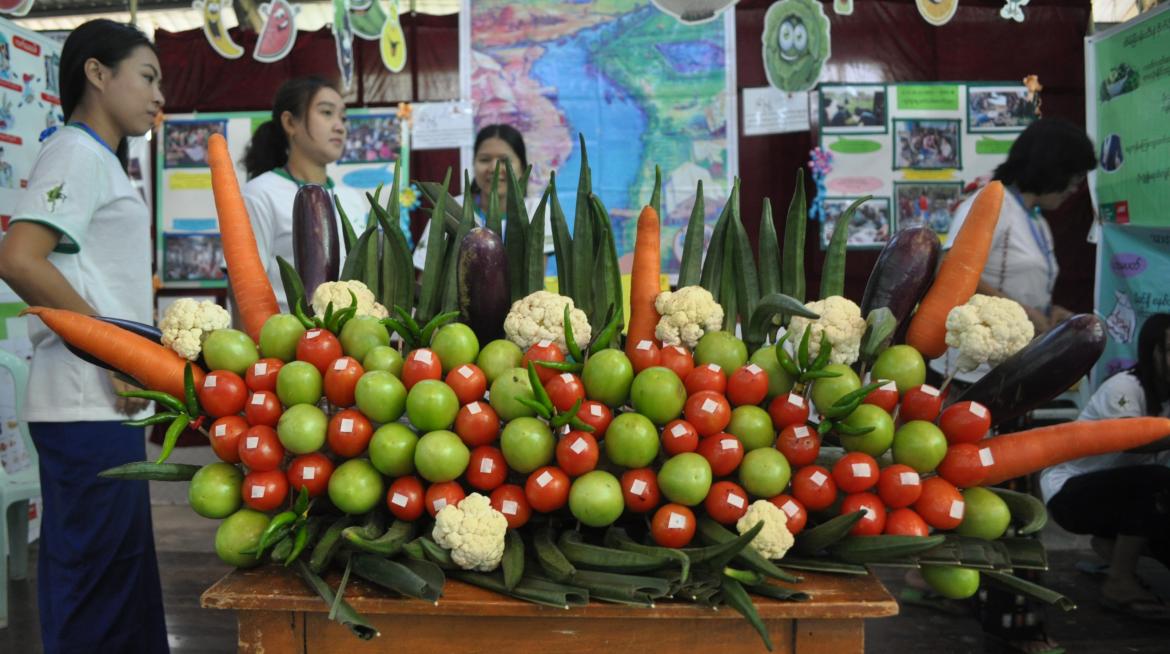
The two-day Bogale Livelihoods Fair, funded by LIFT and organised by the Delta Livelihoods Network (DLN), attracted farmers keen to learn about farming techniques, products and services from organisations working in the agriculture sector.
At the fair in Bogale’s sports hall, more than 1,300 visitors viewed displays of DLN projects and initiatives, saw farming equipment and farm inputs from private sector companies and took part in farmer talks, debates, workshops and vegetable, fruit and photo competitions.
GRET’s Technical Advisor Justine Scholle said the event built on the experience of Agri-Fairs previously organised by GRET and WHH.
She said the Livelihoods Fair in Bogale included more stakeholders, such as development organisations, UN agencies (IOM, LIFT), government departments (Deprtment of Agriculture, Department of Fisheries and the Livestock, Breeding and Veterinary Department) and the private sector. More topics like migration, sustainable agriculture, nutrition and climate change were integrated into the event, giving farmers opportunities to become familiar with different farming practices, learn from each other and increase their knowledge on topics affecting their lives.
She encouraged participants to look for inspiration and take ideas from others they met at the event and apply them to their own lives.
Private sector companies including Pioneer, Win Win Farming Tools, Myanmar CP Livestock Vaccines, Good Brother Farming Tools, Shwe Toe Aung Farming Tools, fertiliser producers Wisara, AWBA, Zebra displayed and explained their products to farmers.
WHH/GRET showcased several projects, including the Link Agriculture, Natural Resource Management and Nutrition (LANN) project, which aims to improve the nutritional status of vulnerable communities by improving access to healthy food and teaching communities about nutrition and hygiene. At the Livelihoods Fair the project displayed nutritious food, snacks and drinks prepared with available village ingredients and crops.
PATH displayed fortified rice produced by two millers in Pathein. Fortified rice is regular rice mixed with specially manufactured vitamin- and mineral-enriched kernels. The fortified kernels include a government-approved dose of iron, zinc, vitamin A, and vitamins B1, B3, B6, B9, and B12. By embedding these elements in a staple food, PATH Ultra Rice® technology increases people’s access to essential micronutrients.
A photo competition provided an opportunity for participants to share with the public their creative skills in capturing aspects of improved livelihoods in rural areas, and the 3 judges chose the photograph titled Livelihood and Small Fishermen, submitted by U Tin Aung Kyaw from Radanar Ayar, as the winner. World Vision Myanmar and GRET came in as second and third in this competition.
The vegetable & fruit competition was open only to vegetables grown organically, applying agroecology practices. Farmers supported by WWH were the winners, taking first and second prizes for their sweet chilli (from Pa Tet village) and banana (from Dar Chaung village) entries. Farmers supported by GRET in Kyee Chaung village won third prize with their bitter gourd entry.
Hla Min, agriculture specialist and speaker at the fair, stressed the importance of the Livelihoods Fair in an interview following his speech: “There is no significant farmer organisation in Myanmar to represent the farmers … In activities like this one, farmers gain opportunities to express their needs, opinions, and exchange views among themselves. This is helpful for them to build their capacity for local governance.”
Mercy Corps and Save the Children were other INGOs present a the fair.
The Delta Livelihoods Network (DLN), the fair's organiser, was formed in 2016 with 17 members representing development stakeholder organisations, government departments, INGOs and NGOs from Bogale and Mawlamyinegyun Townships. Seven member orgainsations (GRET, WHH, IOM, Loka Alhinn, WorldVision, LIFT and FFI) form the DLN Coordination Body. The DLN aims to link development actors through an active network, allowing a better coordination of their actions, providing a space for dialogue, cooperation and support to its members.


